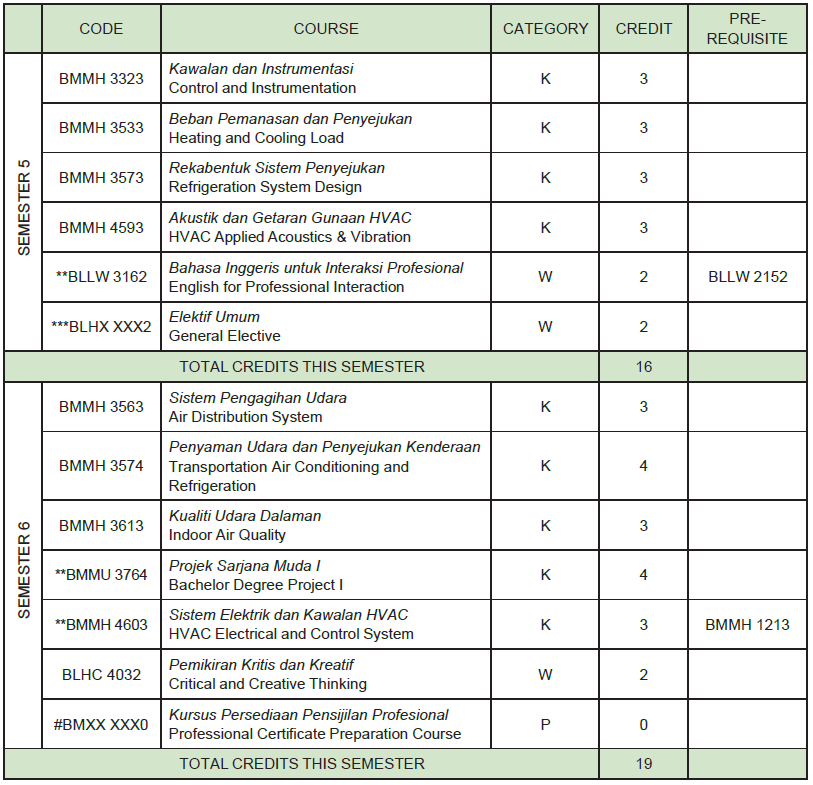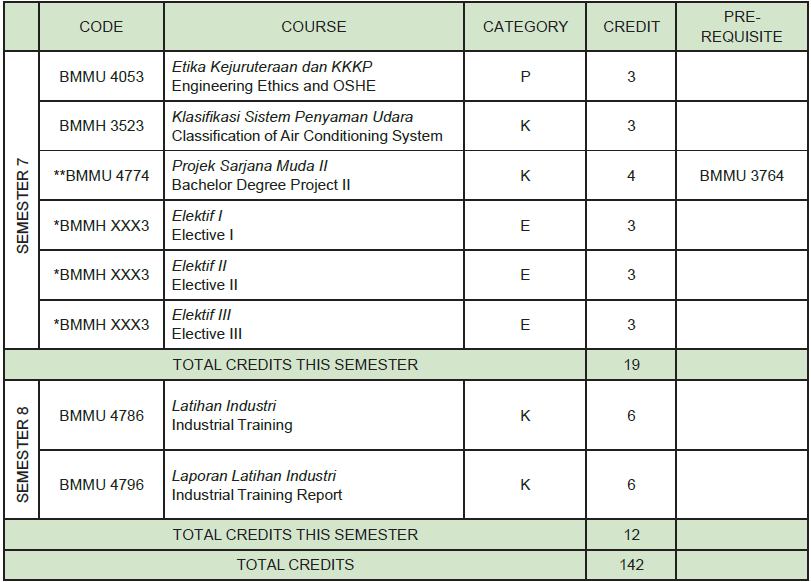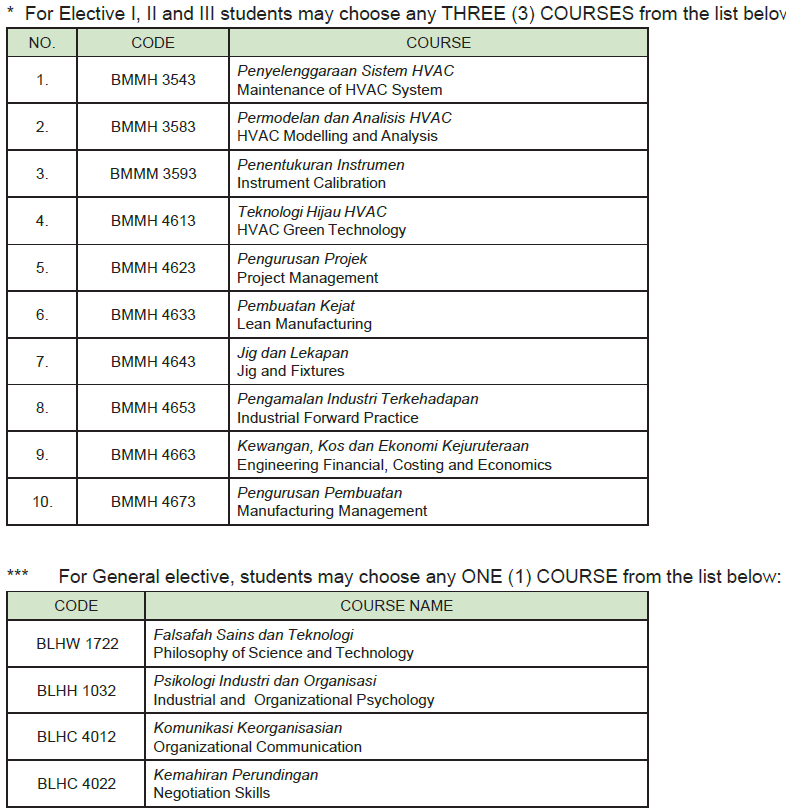Programme Name:
UPU Code:
Short Code:
Programme Durration:
Course Composition:
111 credits
31 credits
Mechanical Engineering Technology (Refrigeration & Air Conditioning) encompasses a range of knowledge disciplines aimed at designing, installing, maintaining, and optimizing HVACR systems to provide comfortable indoor environments while maximizing energy efficiency and sustainability.
Programme Educational Objectives (PEO) are specific goals describing expected achievements of graduates in their career and professional life after graduation. Below are the PEO for the Faculty of Engineering Technology.
PEO1 Graduates who are able to practice the knowledge in Mechanical Engineering Technology (Refrigeration and Air-Conditioning Systems).
PEO2 Graduates who are able to engage with continuous development and adapt to evolving technologies.
PEO3 Graduates who are able to adapt professional ethics and leadership to meet the needs of the society.
Programme Outcomes (PO) are what students are expected to be able to perform or attain by the time of graduation. These relate to the skills, knowledge, and behaviour that students acquire through the programme.
Upon completion of this program, graduate should be able to:
PO1 – Engineering Knowledge
Ability to apply knowledge of mathematics, natural science, computing and engineering fundamentals and engineering specialization principles to defined and applied engineering procedures, processes, systems or methodologies in the field of Mechanical Engineering Technology (Refrigeration and Air Conditioning System).
PO2 – Problem Analysis
Ability to identify, formulate, research literature and analyse broadly-defined engineering problems reaching substantiated conclusions using analytical tools with considerations for sustainable development appropriate to Mechanical Engineering Technology (Refrigeration and Air Conditioning System).
PO3 – Design/Development of Solutions
Ability to design solutions for broadly-defined engineering technology problems and contribute to the design of systems, components or processes to meet identified needs with appropriate consideration for public health and safety, whole-life cost, net zero carbon as well as resource, cultural, societal, and environmental considerations.
PO4 – Investigation
Ability to conduct investigations of broadly-defined engineering problems; locate, search and select relevant data from codes, data bases and literature, design and conduct experiments to provide valid conclusions.
PO5 – Tool Usage
Ability to select and apply, and recognize limitations of appropriate techniques, resources, and modern engineering and IT tools, including prediction and modelling, to broadly-defined engineering problems.
PO6- The Engineering Technologist and the World
Ability to analyze and evaluate sustainable development impacts to: society, the economy, sustainability, health and safety, legal frameworks, and the environment, in solving broadly-defined engineering problems.
PO7 – Ethics
Ability to understand and commit to professional ethics and norms of engineering technology practice and adhere to relevant national and international laws. Demonstrate an understanding of the need for diversity and inclusion.
PO8- Individual and Collaborative Team Work
Ability to function effectively as an individual, and as a member or leader in diverse and inclusive teams and in multi-disciplinary, face-to-face, remote and distributed settings.
PO9 – Communications
Ability to communicate effectively and inclusively on broadly-defined engineering activities with the engineering community and with society at large, by being able to comprehend and write effective reports and design documentation, make effective presentations, taking into account cultural, language, and learning differences.
PO10 – Project Management and Finances
Ability to apply knowledge and understanding of engineering management principles and economic decision-making to one’s own work, as a member and leader in a team and to manage projects in multidisciplinary environments.
PO11 – Life Long Learning
Ability to recognize the need for, and have the ability for independent and life-long learning and critical thinking in the face of new specialist technologies.
The followings are what you will study as a student in Mechanical Engineering Technology (Refrigeration and Air-Conditioning Systems) at FTKM, UTeM.
Basic subjects to enhance the knowledge on fundamental theories in Mechanical Engineering Technology. This includes the laboratory practices to sharpen the theoretical concepts and also non-engineering subjects
Technical Mathematics, Physics, Engineering Graphics, Engineering Materials, Measurement and Instrumentation, Statics, Philosophy and Current Issues, Co-curriculum I, Calculus for Technology, Manufacturing Practices, Fundamental of HVAC Electric and Electronic, Engineering Design, Thermodynamics, English for Academic Purposes, Co-curriculum II
Statistical Methods, Computer Programming, Solid Mechanics, Dynamic and Mechanics of Machine, Modelling and Computer Analysis, Appreciation of Ethics and Civilizations, Technology Entrepreneurship, Advanced Calculus for Technology, HVAC Design Project, Fluid Mechanics, Heat Transfer, Fundamental of HVAC and Refrigeration, Third Language, Academic Writing
Fundamental core subjects of Mechanical Engineering Technology. Still include the laboratory practices and non-engineering subjects.
Advanced core subjects of Mechanical Engineering Technology. This includes a project where students work in a team to produce mechanical product applying all the fundamental theories already studied in the class. Student will also go for industrial training in an industry for ten weeks.
Control and Instrumentation, Refrigeration System Design, Heating and Cooling Load, HVAC Applied Acoustics & Vibration, English for Professional Interaction, General Elective, Indoor Air Quality, Air Distribution System, Transportation Air Conditioning and Refrigeration, HVAC Electrical and Control System, Bachelor Degree Project I, Critical and Creative Thinking, Professional Certificate Preparation Course
Engineering Ethics and OSHE, Bachelor Degree Project II, Classification of Air Conditioning System, Elective I-III, Industrial Training, Industrial Training Report
Elective subjects based on the chosen specialized field. Student will work on a supervised Final Year Project.
With great minds and facilities, comes great responsibilities.



W = University Compulsory Course; P = Common Core Course; K = Programme Core Course; E = Elective Course
Year 1 (Semester 1 & 2)

Year 2 (Semester 3 & 4)

Year 3 (Semester 5 & 6)

Year 4 (Semester 7 & 8)

Elective Courses


How To Apply?
Engineering is not about perfect solution, it is about doing the best you can with limited resources.
Randy Pausch Tweet